最新外研版七年级英语(上)语法专题复习
外研版七年级上英语语法和练习复习

3.Is ___h_e___(他)Alan? What’s ____h_i_s_(他的) last name? What’s __h_is____(他的)phone number? __H_i_s___(他的) father is a teacher. _H_e_(他)often plays basketball. When is _h_i_s_(他的) birthday? What is _h_i_s_(他的)favorite subject?
• 二,用合适的代词填空
1._____I___(我) am a student. ___M__y____ (我的)name is Gina.
This is ____m__y__ (我的)sister.
This pencil is _m__i_n_e(我的). Where is __m__y___(我的)schoolbag? (我的)M___in__eis on the desk. (我的)___M__y______favorite subject is
Who is _y_o_u_r(你的)P.E. teacher. Why do __y_o_u___(你)like P.E.?
When is __y_o_u_r__ (你的) P.E. class?
Where is __y_o__u_r _(你的)schoolbag? (你的)_Y_o_u_r_s is on the desk.
science.
2、Do _y_o_u__(你)have a soccer ball?
Is this __y_o__u_r_(你的) pencil? Do _y_o_u__(你)like bananas?
When is _y_o__u_r(你的) birthday? What is __y_o_u_r_(你的)favorite subject?
(完整)外研版七年级上英语重点语法
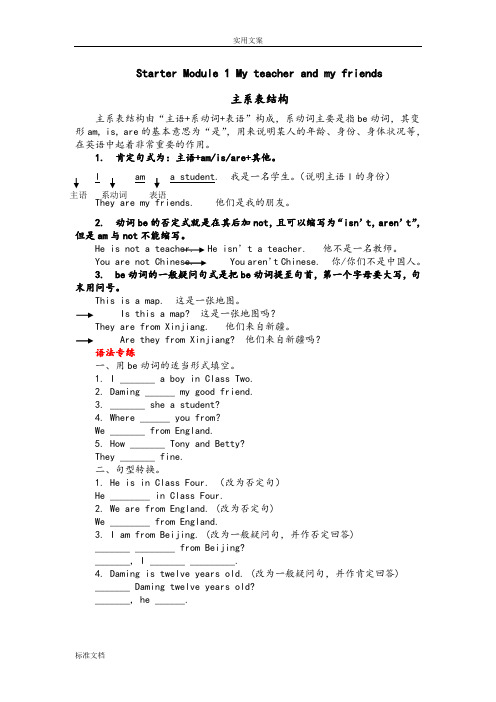
Starter Module 1 My teacher and my friends主系表结构主系表结构由“主语+系动词+表语”构成,系动词主要是指be动词,其变形am, is, are的基本意思为“是”,用来说明某人的年龄、身份、身体状况等,在英语中起着非常重要的作用。
1. 肯定句式为:主语+am/is/are+其他。
I am a student. 我是一名学生。
(说明主语I的身份)主语系动词表语They are my friends. 他们是我的朋友。
2. 动词be的否定式就是在其后加not,且可以缩写为“isn’t,aren’t”,但是am与not不能缩写。
He is not a teacher. He isn’t a teacher. 他不是一名教师。
You are not Chinese. You aren’t Chinese. 你/你们不是中国人。
3. be动词的一般疑问句式是把be动词提至句首,第一个字母要大写,句末用问号。
This is a map. 这是一张地图。
Is this a map? 这是一张地图吗?They are from Xinjiang. 他们来自新疆。
Are they from Xinjiang? 他们来自新疆吗?语法专练一、用be动词的适当形式填空。
1. I _______ a boy in Class Two.2. Daming ______ my good friend.3. _______ she a student?4. Where ______ you from?We _______ from England.5. How _______ Tony and Betty?They _______ fine.二、句型转换。
1. He is in Class Four. (改为否定句)He ________ in Class Four.2. We are from England. (改为否定句)We ________ from England.3. I am from Beijing. (改为一般疑问句,并作否定回答)_______ ________ from Beijing?_______, I _______ _________.4. Daming is twelve years old. (改为一般疑问句,并作肯定回答)_______ Daming twelve years old?_______, he ______.Starter Module 2 My English lesson祈使句1. 祈使句可用来表示命令、请求和建议等意义的句子。
初中英语新外研版七年级上册Unit 2 More than fun语法讲解
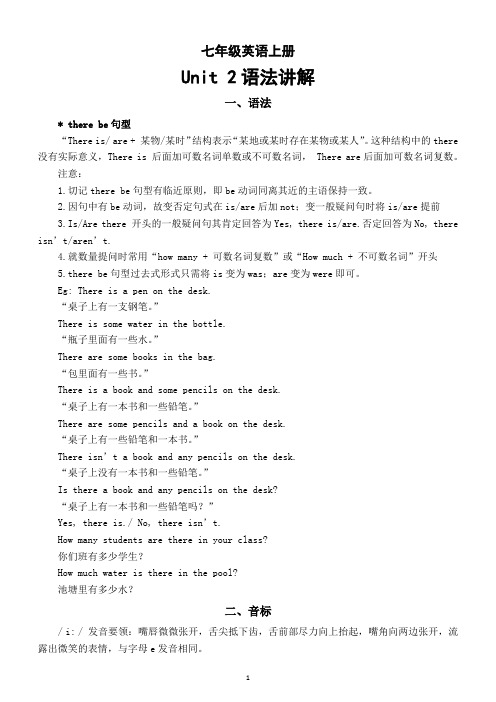
七年级英语上册Unit 2语法讲解一、语法* there be句型“There is/ are + 某物/某时”结构表示“某地或某时存在某物或某人”。
这种结构中的there 没有实际意义,There is 后面加可数名词单数或不可数名词, There are后面加可数名词复数。
注意:1.切记there be句型有临近原则,即be动词同离其近的主语保持一致。
2.因句中有be动词,故变否定句式在is/are后加not;变一般疑问句时将is/are提前3.Is/Are there 开头的一般疑问句其肯定回答为Yes, there is/are.否定回答为No, there isn’t/aren’t.4.就数量提问时常用“how many + 可数名词复数”或“How much + 不可数名词”开头5.there be句型过去式形式只需将is变为was;are变为were即可。
Eg: There is a pen on the desk.“桌子上有一支钢笔。
”There is some water in the bottle.“瓶子里面有一些水。
”There are some books in the bag.“包里面有一些书。
”There is a book and some pencils on the desk.“桌子上有一本书和一些铅笔。
”There are some pencils and a book on the desk.“桌子上有一些铅笔和一本书。
”There isn’t a book and any pencils on the desk.“桌子上没有一本书和一些铅笔。
”Is there a book and any pencils on the desk?“桌子上有一本书和一些铅笔吗?”Yes, there is./ No, there isn’t.How many students are there in your class?你们班有多少学生?How much water is there in the pool?池塘里有多少水?二、音标/ i: / 发音要领:嘴唇微微张开,舌尖抵下齿,舌前部尽力向上抬起,嘴角向两边张开,流露出微笑的表情,与字母e发音相同。
(完整版)外研版七年级上各单元知识点

七年级英语上册模块复习MODULE 1一、同义句1.My name's Daming. = I'm Daming.2.I'mfrom England. = I come from England.3.Are you a new student. ≈ Are you new?4.Nice to meet you. = Nice to see you. =Glade to meet you. = Glade to see you.5.What's your name. = May I have your name. 二、特殊疑问句—What's your name. —How old are you? = Can you tell me your age? —My name is .... = What's your age? —I'm twelve years old. —Where are you from? —What class are you in?—I'm from... —I'm in Class One, Grade One. 三、单词短语1.practise + ding sth.2.with &and A and B go to the bank. A with B goes to the bank. 人称单 数复 数 主格形容性物主代词主格 形容性物主代词第一人称 I my we our 第二人称 you your you your第三人称he his theytheirshe her ititsMODULE 2一、family members:aunt uncle grandma grandmother grandpa grandfather mother father mum dad sister brother 二、短语句型Thank you for your email. your help.helping me.asking me.inviting me.Make a family tree for your family.----How many people are there in your family?----There are four. There are my mum and dad, my sister and me. ----Have you got an aunt?/any .....?thank (sb.) for sth.thank (sb.) for doing sth.say to sb. it againt alkabout sth. with sb.----Yes,I have./No,I haven't.----Have you got a small family or a big family? ----I've got a big family.(选择疑问句) or 的用法:① 或;② 并列否定:I don't like swimming or dancing. 一、单词职业:doctor manager secretary worker teacher工作地点:factory hospital hotel office school university 二、短语a photo\picture of my family三、语法(can) Can do sth.I can\can't ride a bike. Can you ride a bike? Yes, I can.\No, I can't. 四、句子What does your ... do?=What is\are you ...'s job?=What is your ...? He\She is a ... They're ...MODULE 3一、单词1.building in school: classroom dining hall gym library office science lab2.something: blackboard book classroom computer desk dictionary football library picture television3.numbers: thirteen fourteen fifteen sixteen seventeen eighteen nineteen thirty forty fifty sixty seventy eighty ninety4.介词:next to ≈ near behind ≠ in front of in on under5. in front of:在......前面in the front of:在......里面的前面 6.right 正确的≠wrong ≠left二、语音 er 、or 、ur 发/ə/ 三、语法(There be)----Are there any school offices?----Yes, there are. There are some offices. ----Is there a computer on Miss Li's desk?play basketball football tennis table tennis the pianoride a bike\horsespeak English\Japanese\Chinese sing (a song) swima university an office twofactories cities universities secretaries1.there is/are +sth./sb. + sw.2.How many + n. + are there + sw.5.----No, there isn't. 注意:1.就近原则:There is some meat and two apple on the desk. 2.名词所有格:Miss Li's herLily and Lucy's 两人共有的 eg: Lily and Lucy's father. Lily's and Lucy's 两人各有的 Lily's and Lucy's fathers.MODULE 4一、单词1. orange 橙汁 have some orange [U ] 橙色 the oranges are orange [C ] 橙子 This is an orange [C ]2.Kind 善良 He is very kind.种类=tyre a kind / type of fruit two kinds /types of fruits 3. gym: 不受天气影响的室内体育馆、健身房或运动馆 stadium: 周围有看台的露天大型运动场 4.healthy ≠ unhealthy keep/stay healthyin good health ≠ in poor/bad health be healthy = be in healthgood for on e health ≠ bad for one health 条件 变化形式例词 一般情况+ - s shops 单词以s 、x 、ch 、sh 结尾 + - es buses 以辅音字母+y 结尾 去y 为i + -escity-cities 单词以“o”结尾有生命 + - estomatoes 无生命+ - szoos 一些以‘f’或‘fe’结尾的单词把’f‘或’fe‘变成’ves'knife-knivesbe on film star football matches piano lesson see a film watch a magic show ride a bike /horse stay at homeat the party the stadium Sun theatre New Times Cinema Garden Hotel night the photo the fridge China / Beijing 2008 the day the morningthe phonethe playgroundSunday a sunny day the morning of June 1stin on see a film / see films = go to the cinema(问时间具体几点钟)三、句型四、区别MODULE 5一、短语about sth.谈论某事talk to sb. 跟某人谈话(一方讲一方听) with sb. 跟某人谈话(双方都讲) get up≠go to bedgo home≠leave home(for)study science/history/chemistry/maths/... 二、语法 ①时间表达法:____ What's the time?What time it is?直 读 法 : It's two ten. (2:10)----Have you got any ......?----Yes,we have./No,we haven't Would you like sth.to do sth. Let's do sth.What's the price of......?Best wish to sb.for teachers' day I have no time. I don't have time . wantwould likeask/invite sb. teachtellto do sth.pleaseletwouldcouldcanmustdodoesdo sth.likepracticeThank you forfinishstarMy hobby isfavourite sport is a cup of tea a glass of water a can of coke a bottle of juice a bowl of rice a piece of meat doing 希望别人得到肯定回答的疑问句用'some ' eg: Do you have some money for me?two cups of tea two glasses of water two cans of coke two bottles of juice two bowls of rice two pieces of meata breakhave Chinese/a Chinese lesson breakfast/lunch/dinner/supper start sth.(my homework)to do sth.(to do my homework) doing sth.(doing my homework) finish sth.(my homework)doing sth.(doing my homework) What about/How about youdoing sth.half an hourcut the apple into two halves a quarter past two 2:15 a quarter to two 2:45 half past two 2:30 ____ 逆 读 法 : ①It's ten past two.(2:10) ≤30'②It's ten to ten. (2:50) >30' 整点表达法:It's two o'clock. (2:00)注意: (不用介词) 1. 2.3. ②一般现在时(1) 【No. 1】一般现在时的功能1.表示事物或人物的特征、状态。
七年级英语上册语法专题复习(最新外研版)
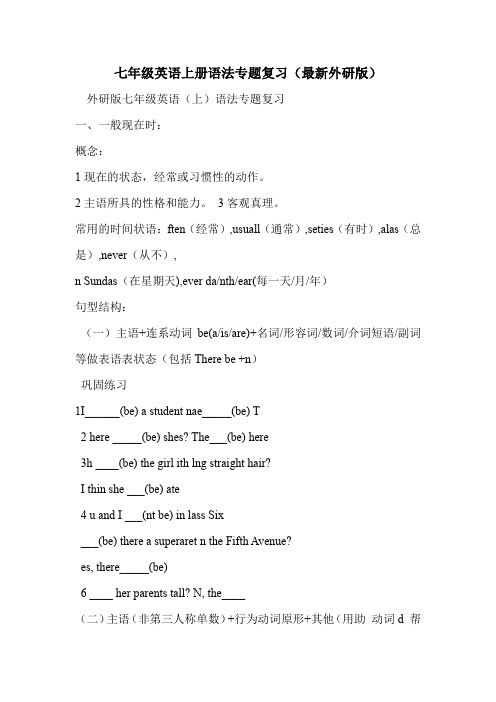
七年级英语上册语法专题复习(最新外研版)外研版七年级英语(上)语法专题复习一、一般现在时:概念:1现在的状态,经常或习惯性的动作。
2主语所具的性格和能力。
3客观真理。
常用的时间状语:ften(经常),usuall(通常),seties(有时),alas(总是),never(从不),n Sundas(在星期天),ever da/nth/ear(每一天/月/年)句型结构:(一)主语+连系动词be(a/is/are)+名词/形容词/数词/介词短语/副词等做表语表状态(包括There be +n)巩固练习1I______(be) a student nae_____(be) T2 here _____(be) shes? The___(be) here3h ____(be) the girl ith lng straight hair?I thin she ___(be) ate4 u and I ___(nt be) in lass Six___(be) there a superaret n the Fifth Avenue?es, there_____(be)6 ____ her parents tall? N, the____(二)主语(非第三人称单数)+行为动词原形+其他(用助动词d 帮助构成否定句、一般疑问句和特殊疑问)主语(第三人称单数)+行为动词的第三人称单数+其他(用-助动词des 帮助构成否定句、一般疑问句和特殊疑问句)行为动词第三人称单数的构成1在词尾加-s:spea-speas, r-rs2以“辅音+”结尾,把改为i,再加-es:stud-studies3以s,x,h,sh结尾,加-es:ath-athes teah-teahes特殊情况:have-has d-des g— ges巩固练习1His parents _______(ath) TV ever night brther _________(d) her ever da2His parents _________(nt ath) ever nightbrther________(nt d)her ever da3_____his parents_____(ath) TV ever night ? ______ ur brther _____ (d)her ever da?4He ____(have) t sistersPeter____(stud) hard二.现在进行时:表示说话瞬间或现阶段正在进行的动作。
外研版七年级英语上册M1重点知识(语法、短语句子,原文)
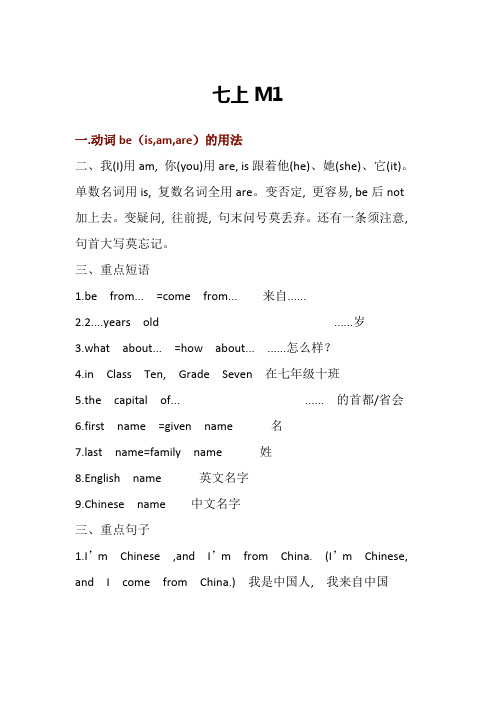
七上M1一.动词be(is,am,are)的用法二、我(I)用am, 你(you)用are, is跟着他(he)、她(she)、它(it)。
单数名词用is, 复数名词全用are。
变否定, 更容易, be后not 加上去。
变疑问, 往前提, 句末问号莫丢弃。
还有一条须注意, 句首大写莫忘记。
三、重点短语1.be from...=come from...来自......2.2....years old......岁3.what about...=how about.........怎么样?4.in Class Ten,Grade Seven在七年级十班5.the capital of.........的首都/省会6.first name=given name名st name=family name姓8.English name英文名字9.Chinese name中文名字三、重点句子1.I’m Chinese,and I’m from China.(I’m Chinese, and I come from China.)我是中国人,我来自中国2.Where are they from?(=Where do they come from?)他们来自什么哪里?They are from America.(=They come from America.)他们来自美国.3.How old is that man?那位男子多少岁了?He is forty-four.他44岁4.The students are in Class Five,Grade Seven.这些学生在七年级五班5.Tom is in Class One with Lingling.汤姆和玲玲在一班。
=Tom with Lingling is in Class One.=Tom and Lingling are in Class One.6.What about you?=How about you?=And you?你呢?/你怎么样?7.Welcome to Class6Grade7!欢迎到七年级六班。
(完整word版)外研版七年级英语上语法知识点汇总(良心出品必属精品)
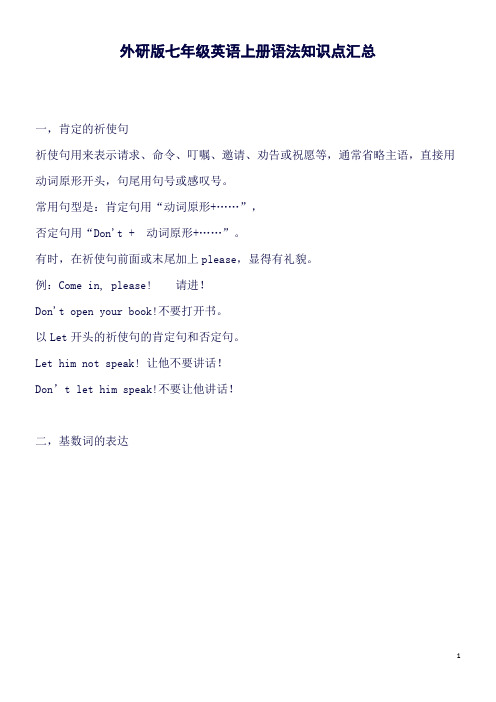
外研版七年级英语上册语法知识点汇总一,肯定的祈使句祈使句用来表示请求、命令、叮嘱、邀请、劝告或祝愿等,通常省略主语,直接用动词原形开头,句尾用句号或感叹号。
常用句型是:肯定句用“动词原形+……”,否定句用“Don't + 动词原形+……”。
有时,在祈使句前面或末尾加上please,显得有礼貌。
例:Come in, please! 请进!Don't open your book!不要打开书。
以Let开头的祈使句的肯定句和否定句。
Let him not speak! 让他不要讲话!Don’t let him speak!不要让他讲话!二,基数词的表达三,what引导的特殊疑问句疑问词what引导的特殊疑问句,询问事物内容或者人的职业。
此类疑问句可以对主语、表语和宾语提问。
1. 对主语提问例:What is in your pocket?你口袋里有什么?这个问题可以有两种回答:a:There is an egg in it. 在口袋里有一个蛋。
b:An egg (is in it). 一个蛋(在里面)。
-What are there in the room? 屋子里有什么?-There are a lot of chairs in it. 里面有许多椅子。
注意:回答此句型的问题时,答句的单复数根据实际情况而定。
2. 对宾语提问例:-What did you buy?-你买了什么?-I bought a bike.-我买了辆自行车。
3. 对表语提问例:-What is this?-这是什么?-It's a bench. -这是一条长凳。
-What is your mother?-你妈妈是干什么的?-She is a teacher. 她是一名老师。
注意:What is+人? 此句型询问人的职业。
还可用What is sb's job?或者What does/do sb. do? 询问人的职业。
七年级英语上册语法专题复习(最新外研版)
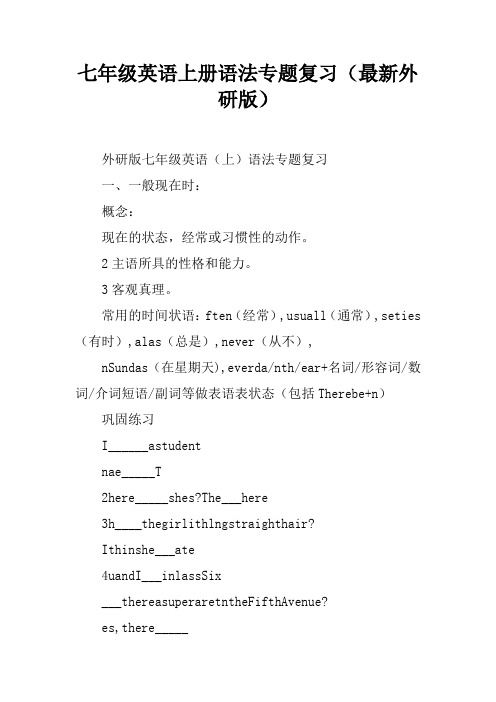
七年级英语上册语法专题复习(最新外研版)外研版七年级英语(上)语法专题复习一、一般现在时:概念:现在的状态,经常或习惯性的动作。
2主语所具的性格和能力。
3客观真理。
常用的时间状语:ften(经常),usuall(通常),seties (有时),alas(总是),never(从不),nSundas(在星期天),everda/nth/ear+名词/形容词/数词/介词短语/副词等做表语表状态(包括Therebe+n)巩固练习I______astudentnae_____T2here_____shes?The___here3h____thegirlithlngstraighthair?Ithinshe___ate4uandI___inlassSix___thereasuperaretntheFifthAvenue?es,there_____6____herparentstall?N,the____(二)主语(非第三人称单数)+行为动词原形+其他(用助动词d帮助构成否定句、一般疑问句和特殊疑问)主语(第三人称单数)+行为动词的第三人称单数+其他(用-助动词des帮助构成否定句、一般疑问句和特殊疑问句)行为动词第三人称单数的构成在词尾加-s:spea-speas,r-rs2以“辅音+”结尾,把改为i,再加-es:stud-studies 3以s,x,h,sh结尾,加-es:ath-athesteah-teahes特殊情况:have-hasd-desg—ges巩固练习1Hisparents_______TVevernightbrther_________hereverda2Hisparents_________evernightbrther________hereverda3_____hisparents_____TVevernight?______urbrther_____hereverda?4He____tsistersPeter____hard二.现在进行时:表示说话瞬间或现阶段正在进行的动作。
外研版七年级英语上语法专项复习(含答案)
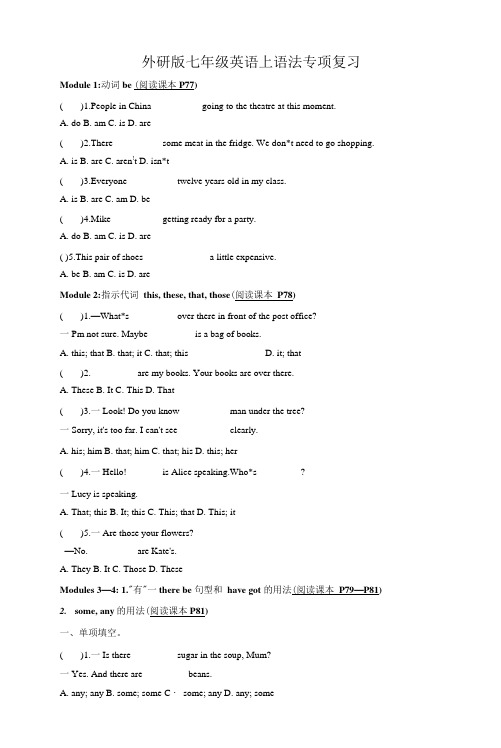
外研版七年级英语上语法专项复习Module 1:动词be (阅读课本P77)( )1.People in China ________ going to the theatre at this moment.A. doB. amC. isD. are( )2.There ________ some meat in the fridge. We don*t need to go shopping.A. isB. areC. aren!tD. isn*t( )3.Everyone ________ twelve years old in my class.A. isB. areC. amD. be( )4.Mike _________ getting ready fbr a party.A. doB. amC. isD. are( )5.This pair of shoes ____________ a little expensive.A. beB. amC. isD. areModule 2:指示代词this, these, that, those(阅读课本P78)( )1.—What*s ________ over there in front of the post office?一Pm not sure. Maybe ________ is a bag of books.A. this; thatB. that; itC. that; thisD. it; that( )2. ________ are my books. Your books are over there.A. TheseB. ItC. ThisD. That( )3.一Look! Do you know ________ man under the tree?一Sorry, it's too far. I can't see _________ clearly.A. his; himB. that; himC. that; hisD. this; her( )4.一Hello! _____ is Alice speaking.Who*s ________ ?一Lucy is speaking.A. That; thisB. It; thisC. This; thatD. This; it( )5.一Are those your flowers?—No. _________ are Kate's.A. TheyB. ItC. ThoseD. TheseModules 3—4: 1."有"一there be 句型和have got 的用法(阅读课本P79—P81)2.some, any的用法(阅读课本P81)一、单项填空。
外研版英语七年级上学期语法专题复习 Be动词用法及练习(答案含解析)
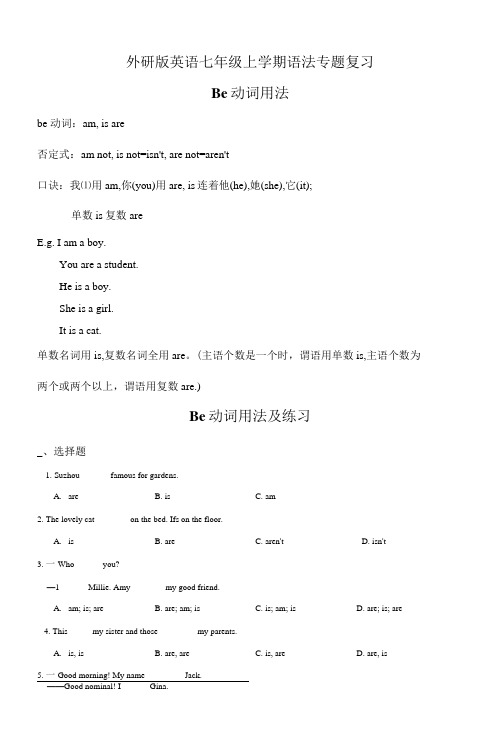
外研版英语七年级上学期语法专题复习Be动词用法be 动词:am, is are否定式:am not, is not=isn't, are not=aren't口诀:我⑴用am,你(you)用are, is连着他(he),她(she),它(it);单数is复数areE.g. I am a boy. _______________________You are a student. _________________________He is a boy. __________________She is a girl. _________________It is a cat. _________________________单数名词用is,复数名词全用are。
(主语个数是一个时,谓语用单数is,主语个数为两个或两个以上,谓语用复数are.)Be动词用法及练习_、选择题1. Suzhou _______ f amous for gardens.A.areB. isC. am2. The lovely cat _______ on the bed. Ifs on the floor.A.isB. areC. aren'tD. isn't3. 一Who ______ you?—1____ Millie. Amy _ ___ my good friend.A.am; is; areB. are; am; isC. is; am; isD. are; is; are4. This____ my sister and those ________ my parents.A.is, isB. are, areC. is, areD. are, is5. 一Good morning! My name ________ Jack.——Good nominal! I Gina.30.【答案】B【解析】句意:-- 你好吗?---- 我很好。
外研社七年级(上)语法点讲解和练习

一、名词单复数可数名词的复数——1.一般情况下 + sbook-books; bird-birds2.以辅音字母+y 结尾, 变y 为 i ,再加esstory-stories; party-parties3.以s, sh, ch ,x 结尾的单词 + esbus-buses; dish-dishes; watch-watches; box-boxes4.以辅音字母+o 结尾的+espotato-potatoes; tomato-tomatoes; hero-heroes(photo-photos; piano-pianos )5.以f 或fe 结尾的把f 或fe 变为v ,再加esshelf-shelves; leaf-leaves;knife-knives; wife-wives; life-lives不规则名词的复数——man →men, woman →women, child →children, tooth →teeth, foot →feet,sheep →sheep, deer →deer, fish →fish二、some 和any 的用法Some 用于肯定句(在提出建议,请求的时候some ),any 用于否定句和疑问句。
1) Ann has________ candies.2) Bill doesn't have________ money.4) There is________ milk in the fridge.5) There isn't________ beer.6) There aren't________ boys in my family.7)Would you like ______ water to drink?1. house _________2. village ___________3. map __________4. bag ___________5. bus ___________6. city __________7. box ___________8. baby __________9. dictionary __________ 10. watch _________11. woman _________ 12. match __________ 13. man _________ 14. tooth __________ 15. wife ___________ 16. foot ___________ 17. knife __________ 18. sheep __________ 19. life ___________ 20. child __________三there be 和have 的区别"there be"与"have"译成汉语时都bai有一个"有"字,这二du者之间又有什么区别呢?且zhi 看下面的比较。
外研版英语七年级上册语法总结
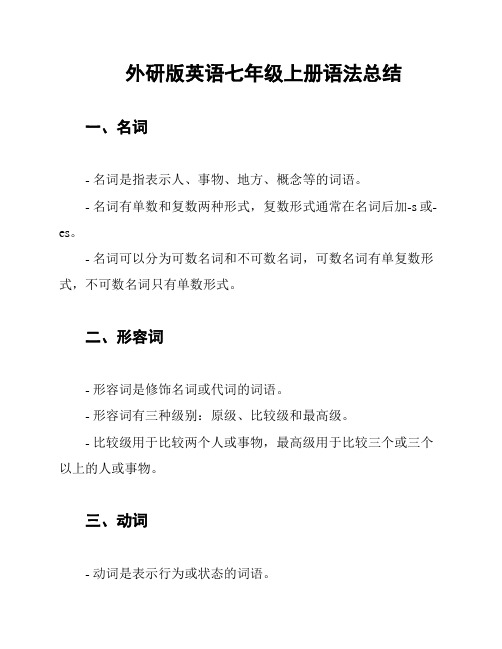
外研版英语七年级上册语法总结一、名词- 名词是指表示人、事物、地方、概念等的词语。
- 名词有单数和复数两种形式,复数形式通常在名词后加-s或-es。
- 名词可以分为可数名词和不可数名词,可数名词有单复数形式,不可数名词只有单数形式。
二、形容词- 形容词是修饰名词或代词的词语。
- 形容词有三种级别:原级、比较级和最高级。
- 比较级用于比较两个人或事物,最高级用于比较三个或三个以上的人或事物。
三、动词- 动词是表示行为或状态的词语。
- 动词有一般现在时、一般过去时和一般将来时等时态。
- 动词的现在分词和过去分词可以作形容词使用。
四、代词- 代词是用来替代名词的词语。
- 代词分为人称代词、物主代词、指示代词和不定代词等。
五、冠词- 冠词是用来限定名词的词语,分为定冠词和不定冠词。
- 定冠词有唯一性,指特指某一个人或物。
六、介词- 介词是连接名词或代词与其他词语之间关系的词语。
- 介词通常放在名词或代词之前。
七、副词- 副词是修饰动词、形容词、副词和句子的词语。
- 副词有程度副词、频率副词和时间副词等。
八、连词- 连词是连接词组、词语或句子的词语。
- 连词可分为并列连词、从属连词和选择连词等。
九、数词- 数词是用来表示数量的词语,分为基数词和序数词。
- 基数词表示具体的数目,序数词表示顺序或次序。
十、感叹句- 感叹句是表达强烈情感或感叹的句子。
- 感叹句常常以感叹词开头,后面跟倒装的句子。
以上为外研版英语七年级上册的基本语法总结,希望对你有帮助。
(完整)外研版七年级上英语语法复习
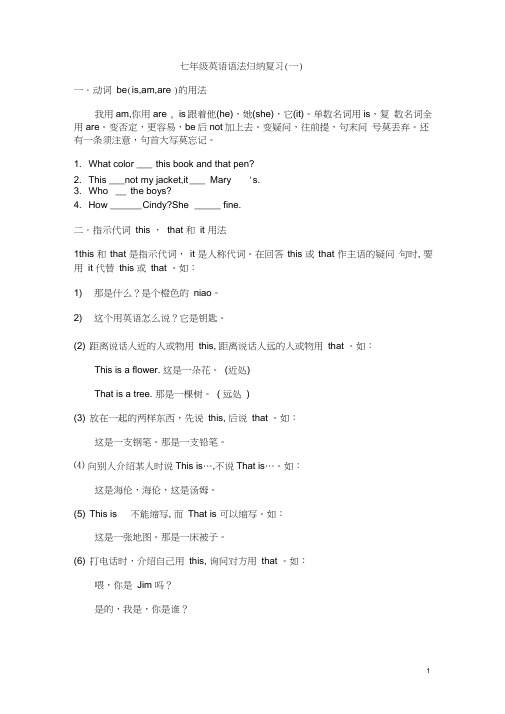
七年级英语语法归纳复习(一)一.动词be(is,am,are )的用法我用am,你用are , is跟着他(he),她(she),它(it)。
单数名词用is,复数名词全用are。
变否定,更容易,be后not加上去。
变疑问,往前提,句末问号莫丢弃。
还有一条须注意,句首大写莫忘记。
1. What color ___ this book and that pen?2. This ___not my jacket,it ___ Mary 's.3. Who __ the boys?4. How ______ C indy?She _____ fine.二.指示代词this ,that 和it 用法1this 和that 是指示代词,it 是人称代词。
在回答this 或that 作主语的疑问句时, 要用it 代替this 或that 。
如:1) 那是什么?是个橙色的niao。
2) 这个用英语怎么说?它是钥匙。
(2) 距离说话人近的人或物用this, 距离说话人远的人或物用that 。
如:This is a flower. 这是一朵花。
(近处)That is a tree. 那是一棵树。
( 远处)(3) 放在一起的两样东西,先说this, 后说that 。
如:这是一支钢笔。
那是一支铅笔。
⑷向别人介绍某人时说This is…,不说That is…。
如:这是海伦,海伦,这是汤姆。
(5) This is 不能缩写, 而That is 可以缩写。
如:这是一张地图。
那是一床被子。
(6) 打电话时,介绍自己用this, 询问对方用that 。
如:喂,你是Jim 吗?是的,我是,你是谁?三.冠词冠词是虚词 ,用在名词或名词词组的前面 ,表示名词是特指还是泛指。
冠词可分为不定冠词、定冠词和零冠词。
不定冠词有 a, an 。
定冠词有the. 其中 , a 用在发音以辅音开头的名词之前 , 而 an 则 用在发音以元音开头的名词之前。
外研版初一(上)英语重点语法汇总
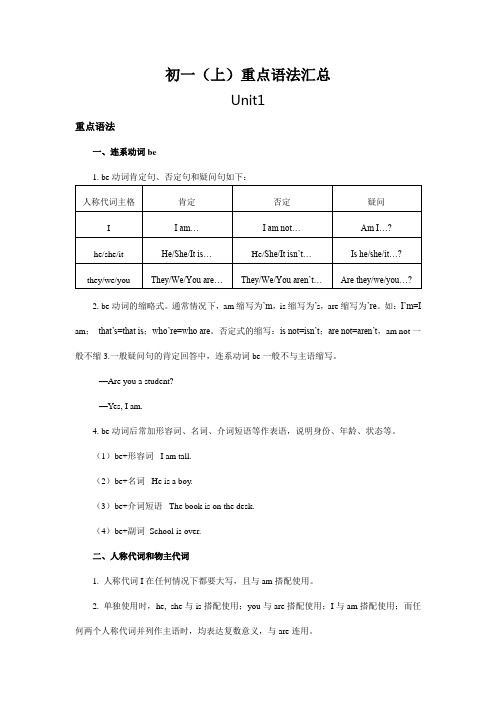
初一(上)重点语法汇总Unit1重点语法一、连系动词be1. be动词肯定句、否定句和疑问句如下:2. be动词的缩略式。
通常情况下,am缩写为’m,is缩写为’s,are缩写为’re。
如:I’m=I am;that’s=that is;who’re=who are。
否定式的缩写:is not=isn’t;are not=aren’t,am not一般不缩3.一般疑问句的肯定回答中,连系动词be一般不与主语缩写。
—Are you a student?—Yes, I am.4. be动词后常加形容词、名词、介词短语等作表语,说明身份、年龄、状态等。
(1)be+形容词 I am tall.(2)be+名词 He is a boy.(3)be+介词短语 The book is on the desk.(4)be+副词School is over.二、人称代词和物主代词1. 人称代词I在任何情况下都要大写,且与am搭配使用。
2. 单独使用时,he, she与is搭配使用;you与are搭配使用;I与am搭配使用;而任何两个人称代词并列作主语时,均表达复数意义,与are连用。
3. 单数人称代词并列作主语时,英语中的顺序通常是:第二人称→第三人称→第一人称,即:you and he; you and I; he and I。
4. 在口语中,如果人称代词孤立地用于不带谓语动词的句子中作主语,习惯上用宾格;如果用主格,就要带谓语动词。
—I like playing baseball.—Me, too.5. 人称代词的主格和与之相对应的形容词性物主代词,如下表:6. 形容词性物主代词的用法与形容词用法相似,具有形容词的性质。
作定语修饰名词一般放在被修饰的名词之前,不能单独使用。
如果名词前面还有其他的定语,物主代词要放在其他定语的前面。
例如:my pen我的钢笔;my red pen我的红色钢笔Unit2重点语法1.指示代词的基本用法指示代词this, these, that和those是表示“这个,这些,那个,那些”等指示概念的代词,其中this(这个)和these(这些)指离说话的人较近的人或事物;that(那个)和those (那些)指离说话的人较远的人或事物。
外研版英语七年级上学期语法专题复习 havegot用法及练习(有答案含解析)

外研版英语七年级上学期语法专题复习Have got的用法1.定义:have got “表示某人有某物”,如:I have got a brother.注意:如果主语是第三人称或者单数时,就要用has got,如:He has got a brother.2.否定句:(直接在have/has 后+not,缩写为haveift/hasn't),如:I haven't got a brother.He hasn't got a brother.3.一般疑问句:(直接把have/has提前,人称一变二),如:Have you got a brother?Has he got a brother?4.have/has got 与have 的区别:have/has got与have都可以表示“有”,主要的区别就是:have在变否定和疑问句时要助动添,但have/has got变否定和疑问句时,直接在have/has后加not或提前have/has ,如:I have got a brother.否定:I haven't got a brother.一般疑问句:Have you got a brother? Yes , I have/no, I haven'tI have a brother.否定:I don't have a brother.一般疑问句:Do you have a brother?have got练习(含解析)【知识点】any、一般疑问句及回答29.【答案】Has; got; any【知识点】三单、any、一般疑问句及回答30.【答案】Have; any【知识点】any、一般疑问句及回答31.【答案】Have; got【知识点】一般疑问句及回答32.【答案】Has; got; any【知识点】三单、一般疑问句及回答33.【答案】hasn't; got; any【知识点】否定句、any34.【答案】Yes; I; have【知识点】一般疑问句及回答35.【答案】Has; got; any【知识点】any、一般疑问句及回答36.【答案】hasn't; got; any【知识点】否定句37.【答案】Has; got; any【知识点】一般疑问句及回答、any38.【答案】Have; you; got【知识点】一般疑问句及回答39.【答案】No; I; haven't【知识点】一般疑问句及回答40.【答案】haven't; got; any【知识点】否定句41.【答案】has; got【知识点】肯定句42.【答案】haven't; got; any【知识点】否定句43.【答案】Have; got; any【知识点】一般疑问句及回答、any 44.【答案】have; haven't【知识点】一般疑问句及回答45.【答案】Has; got; any; No; hasn't【知识点】一般疑问句及回答46.【答案】Has; got; any【知识点】一般疑问句及回答47.【答案】haven't; got; any【知识点】否定句、any48.【答案】he; has【知识点】一般疑问句及回答49.【答案】hasn't; any【知识点】否定句、any50.【答案】hasn't; got; any【知识点】否定句、any_、选择题1. —Have you got any pens?.They are on my desk.Oh, what's it about?some good friends in China and she often visits them.6. —Have you got any pens?.They are on my desk.7. —Has he got a new bag?.And the bag is green.A. does; gotB. do; haveC. have; gotD. has; got—No,A. Have; she has A. Yes, he has B . No, he hasn't C. Yes, he is D. No, he isn't8. Candy and Tinatheir new flats. And theywork hard. 9.A, has got; both B. have got; bothC. has got; allD, have got; allClaire loves shopping on line. How many new dresses she10. your sister got apples?A. Yes, I amB. No, I'm notC. Yes, I haveD. No, I haven't2.the children got anything to drink?—Yes, everyone got a cup of milk. A. Has; hasB. Have; haveC. Has; haveD. Have; has3. —Have you got any melons?A. Yes, we do.B. Yes, we have. C ・ No, we don't. D. No, we have.4. —Hea new book.A. have gotB. haven't gotC. has gotD. hasn't got5. BettyA, has gotC. haveD. have gotA. Yes, I amB. No, I'm notC. Yes, I haveD. No, I haven'tB. Has; she hasC ・ Have; she hasn*t D. Has; she hasn't11.—_____ s he ______ a cute dog?一No, she hasn't.A. Have; gotB. Has; got12.She _____ got any chocolate.A. haveB. has13.一Has Lucy got any milk?.A. Yes, I doC. No, she hasn't14.Lily and I _____ a new computer.A. there isB. there areC. Do; haveC.haven'tB. Yes, there isD.No, Tm notC ・ has gotD. Does; haveD. hasn'tD, have got15. We _____ any oranges, so let's go shopping to get some.A. haven't gotB. has16. —____ y ou _____ a brother?—Yes, I _____ .A. Have; got; haveC. Do; got; do C.hasn't gotB. Are; have; doD. A and BD. have17. —Have they got any carrots?,they . They have got some tomatoes.A. Yes; doB. No; don'tC. Yes; haveD. No; haven't18.He can't get into the room. He ____ a key.A. hasn't gotB. doesn't19.一Have they got any bananas?—. Can you give them some?A. Yes, we haveC. Yes, they have C.isn'tB. No, I haven'tD.No, they haven'tD. aren't20. 一Have they got any carrots?—. Can you give them some?A. Yes, they haven't C. No, they haven*tD. No, they have21. Tony, let*s go shopping for food and drink. Now, we ____ any meat.A, haven't gotB. have gotC. got 二、填空题22. Tony has got a lovely dog.(改为否定句)Tony _________ a lovely dog. 23. Have you ____ (get ) a new book? 24. Do you have any brothers?(改为同义句)_____________ any brothers?25. 一Have you got any juice, Kate?(作否定回答)—No, ________ .26. Pve got some pears.(改为一般疑问句)___ you __________ pears?27. Li Lei has got some friends from England.(改为否定句)Li Lei ______________ friends from England.28. Pve got some questions to ask in the class.(改为一般疑问句)___ you got ____ questions to ask in the class? 29. Nancy has got some orange juice.(改为一般疑问句)___ Nancy __________ orange juice?30. Fve got some questions to ask in the class.(改为一般疑 I 可句)___ you got ____ questions to ask in the class?31. We*ve got chicken at home.(改为疑问句)___ you ____ chicken at home?32. My father has got some meat for lunch.(改为一般疑问句)___ your father __________ meat for lunch? 33. She has got some meat.(改为否定句)Shemeat.B. Yes, they've D. hasn*tgot34.Have you got any fruit juice?(作出肯定回答)35.Tony has got some milk.(改为一般疑问句)___ Tony __________ milk?36.She has got some interesting news.(改为否定句)She ______________ interesting news.37.She has got some good friends in her new school.(改为一般疑问句)___ she __________ good friends in her new school?38.I have got a new book.(改为一般疑问句)_____________ a new book?39.Have you got a nice bike as a birthday gift?(作否定回答)____ , ___ ___ •40.There isn't any meat in the fridge.(改写为have got 句型)We _______________ meat in the fridge.41.Tom has a lovely dog.(写出同义句)Tom __________ a lovely dog.42.They have got some water.(改为否定句)They ______________ water.43.They have got some onions.(改为一般疑问句)___ they _________ onions?44.Have they got any melons?(作肯定及否定回答)Yes, they ___ . / No, they ____ .45.Maria has got some apples.(改为一般疑问句并作否定回答)—___ Maria __________ apples?—,she ___ .46.Mary has got some milk.(改为一般疑问句)___ Mary _________ milk?47.We have got some apples.(改为否定句)We ______________ apples.48.Has the boy got any sisters?(作肯定回答)Yes, _________ .49.Tony has got some apples.(改为否定句)Tony ____ got ____ apples.50.Emma has got some tea in the cup.(改为否定句)Emma ______________ tea in the cup.答案选择题1.【答案】C【解析】此题考查的是句型与回答。
- 1、下载文档前请自行甄别文档内容的完整性,平台不提供额外的编辑、内容补充、找答案等附加服务。
- 2、"仅部分预览"的文档,不可在线预览部分如存在完整性等问题,可反馈申请退款(可完整预览的文档不适用该条件!)。
- 3、如文档侵犯您的权益,请联系客服反馈,我们会尽快为您处理(人工客服工作时间:9:00-18:30)。
外研版七年级英语(上)语法专题复习
一、一般现在时:
概念:
1.现在的状态,经常或习惯性的动作。
2.主语所具的性格和能力。
3.客观真理。
常用的时间状语:often(经常),usually(通常),sometimes(有时),always(总是),never(从不),
on Sundays(在星期天),every day/month/year(每一天/月/年)句型结构:
(一)主语+连系动词be(am/is/are)+名词/形容词/数词/介词短语/副词等做表语表状态(包括There be +n.)
巩固练习
1.I______(be) a student. My name_____(be) Tom.
2. Where _____(be) my shoes? They___(be) here.
3.Who ____(be) the girl with long straight hair?
I think she ___(be) Kate.
4. You and I ___(not be) in Class Six.
5.___(be) there a supermarket on the Fifth Avenue?
Yes, there_____(be).
6. ____ her parents tall? No, they____.
(二)主语(非第三人称单数)+行为动词原形+其他(用助动词do 帮助构成否定句、一般疑问句和特殊疑问)
主语(第三人称单数)+行为动词的第三人称单数+其他(用-助动词does 帮助构成否定句、一般疑问句和特殊疑问句)
行为动词第三人称单数的构成
1.在词尾加-s:speak-speak s, work-work s
2.以“辅音+y”结尾,把y改为i,再加-es:study-stud ies
3.以s,x,ch,sh结尾,加-es:watch-watch es teach-teach es
特殊情况:have-has do-do es go—go es
巩固练习
.1.His parents _______(watch) TV every night. My brother _________(do) homework every day.
2.His parents _________(not watch) every night .
My brother________(not do)homework every day.
3._____his parents_____(watch) TV every night ? ______ your brother _____ (do)homework every day?
4.He ____(have) two sisters.
5.Peter____(study) hard.
二.现在进行时:
表示说话瞬间或现阶段正在进行的动作。
常用的时间状语: now(现在),listen(看),look(听)
at the moment(此刻), at this time(这个时候)。
结构:主语+助动词be(am/is/are)+行为动词的现在分词(v-ing)
现在分词的构成:
1.直接在词尾加-ing: eat-eat ing
2.以“辅音字母+e”结尾,去掉e再加-ing: take-tak ing
3. 以“元音字母+辅音字母”结尾的重读闭音节,先双写该辅音
字母,再加-ing:如
sit-sit ting, put-put ting, begin-begin ning, run-run ning, swim-swim ming, stop-stop ping, get-get ting, shop-shop ping
cut- cut ting, plan→plan ning(计划), prefer→prefer ring(更喜欢)
4.少数以ie结尾的重读开音节的动词,把ie变为y,再加ing。
如:die→d ying(死),lie→l ying(躺) , tie→t ying(拴;系)
巩固练习
1. Jim __________________(take) photos in the park now.
2. Listen!A girl___________(sing) next to the room.
3. ______________Peter____________ (run) in the park now? Yes, he _____. No, he _______.
4. Where _________Marry __________(have) a picnic now?
5.Tom _________(not swim) now,he ________(do) his homework.
6.Lily_______(lie) on the beach at this time.
三、情态动词:
1、任何主语+can/may/must+动词原形
2、主语+ can’t/may not/ mustn’t+
3、词原形3.Can/May/Must + 主语+ 动词原形?
4、疑问词+can/may/must+主语+动词原形?
四、非谓语动词(固定搭配)
1. like+ to do sth.不定式/ like +doingsh.动名词
2.want to do sth.
3. love to do sth.
4. would like to do sth.
5. stop doing sth/ stop to do sth.
6. let sb. do sth.
eg. 1.She wants _____(have) a party.
2.Does he like _______(swim)?
3.Thanks for _______(enjoy) CCTV show.
4.She never stops ____(talk).
五.人称代词:
主格:我(I ), 你(you ) , 他( he ), 她( she ) , 它( it ) , 我们( we ), 你们(you ), 他/她/它们( they)
宾格我(me), 你( you), 他( him), 她(her), 它( it) 我们( us), 你们( you) , 他/她/它们(them)
形容词性物主代词:
我的( my), 你的(your) , 他的( his), 她的(her) ,它的( its)
我们的(our ),你们的(your ),他/她/它们的(their)
名词性物主代词:
我的(mine),你的(yours),他的(his),她的( hers),它的( its) 我
们的(ours), 你们的( yours), ,他/她/它们的( theirs)
巩固练习
1.________(我) am a worker. _________(你) are a
doctor.______(她) is a teacher.
2.This is _____ (他的)shirt.
3. This is __________(我的)pen.
4._________(他们的) trousers are there.
5. I like this picture. Please give ________(它) to ________(我).
6. People get ________(他们的) money from _________(我).
7._____(他们) are new students. _____(他们的)
names are Lucy and Lily.
8. These are _____(我们的) shoes. Can ____(我们)
wear______(它们)?
9.Thank _______(你) for _______(你的) help.
10. _______(他) loves _______(她), and
_______(她)loves_____(他) ,too.
六.特殊疑问句
特殊疑问词在句中起引导作用,主要用来询问人或物、时间、地点、原因、数量等,下面列举一下特殊疑问词的功能:1.what—询问“什么,何物,何事”
2.what time—询问“几点”
3.when—询问“什么时候”,4.where—询问“何地,在哪里”
5.who—询问“谁”6.whose—询问“谁的”7.why—询问“为什么”
8.how old—提问“年龄多大”
9.how many—提问“可数名词的数量”
10.how much—提问“不可数名词的数量或价钱”
11.how often—提问“做某事的频率”
12.how long—提问“时间多长或某物体的长度”
注意:特殊疑问句不能用yes 或no 来回答,而应根据实际情况来回答。
例如:
1.—How old are you?
你多大了?
—I'm twelve years old.
我十二岁了。
2.—How many people are there in your family?
—There are four.
注意:有些疑问词作主语时,语序不变。
如:Who comes from America?
谁来自美国?。
